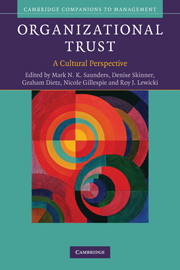Book contents
- Frontmatter
- Contents
- List of figures
- List of tables
- Note on editors
- Note on contributors
- Foreword
- Editors' acknowledgements
- Part I The conceptual challenge of researching trust across different ‘cultural spheres’
- 1 Unravelling the complexities of trust and culture
- 2 Trust differences across national–societal cultures: much to do, or much ado about nothing?
- 3 Towards a context-sensitive approach to researching trust in inter-organizational relationships
- 4 Making sense of trust across cultural contexts
- Part II Trust across different ‘cultural spheres’: inter-organizational studies
- Part III Trust across different ‘cultural spheres’: intra-organizational studies
- Part IV Conclusions and ways forward
- Index
- References
4 - Making sense of trust across cultural contexts
Published online by Cambridge University Press: 05 June 2012
- Frontmatter
- Contents
- List of figures
- List of tables
- Note on editors
- Note on contributors
- Foreword
- Editors' acknowledgements
- Part I The conceptual challenge of researching trust across different ‘cultural spheres’
- 1 Unravelling the complexities of trust and culture
- 2 Trust differences across national–societal cultures: much to do, or much ado about nothing?
- 3 Towards a context-sensitive approach to researching trust in inter-organizational relationships
- 4 Making sense of trust across cultural contexts
- Part II Trust across different ‘cultural spheres’: inter-organizational studies
- Part III Trust across different ‘cultural spheres’: intra-organizational studies
- Part IV Conclusions and ways forward
- Index
- References
Summary
Summary
In this chapter we argue that one way of better understanding how people make sense of trust across cultures is by framing it as a social construction. This recognizes the fluidity and unevenness of trust, thereby questioning any notion of trust being fixed or static. Although trust as a social construction has been recognized before, we argue that the fuller consequences of this have not been explored adequately. Within this chapter we aim to address this, conceptualizing trust as constituted within cultural contexts that are themselves ongoing social constructions. We also discuss how actors construct social phenomena and focus on the role of narrative in this process, leading us to conceptualize trust as a narrative process. Subsequently we discuss a possible research agenda to improve our knowledge of trusting across cultures, and propose research questions to help achieve this.
Introduction
This chapter presents an argument that one way of understanding better how people make sense of trust is by framing it as a social construction. By doing this the fluidity and unevenness of trust is recognized, which questions any notion of trust being fixed or static. This leads us to advocate an understanding of trust in its verb form. Trust as a social construction has been recognized before (e.g. Child and Möllering, 2003; Lewis and Weigert, 1985), but we believe the fuller consequences of this have not been adequately explored. We do this and conceptualize trust as constituted within cultural contexts that are themselves ongoing social constructions.
- Type
- Chapter
- Information
- Organizational TrustA Cultural Perspective, pp. 107 - 126Publisher: Cambridge University PressPrint publication year: 2010
References
- 16
- Cited by

